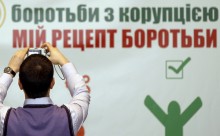Parliament is going to approve the oncoming session’s agenda. It is so far difficult to say what kind of bills the MPs will have to deal with. Undoubtedly, many of them will cause quite a stir. For, against the backdrop of the gas market’s final liberalization and privatization of the national gas pipeline, such things as excise policy, cancellation of privileges for some industries, European integration, etc, arouse interest. The MPs will have to work hard and test their own strength under the pressure of lobbyists or certain business groups. Civic organizations promise to closely watch the lawmakers’ activities and concurrently make public all the draft laws that may carry corruption risks. Above all, the corruption test will be given to the draft laws that come from under the Cabinet’s pen, for they are standing the best chances to be passed by the Verkhovna Rada. Experts believe that the Cabinet moved 76 percent of the bills discussed at the last parliamentary session.
Analysts of the Center for Political Studies and Viktor Chumak, chair of the Parliamentary Committee for Organized Crime Control, have already presented the first results of their surveys. They have concluded that a third of the bills the Cabinet moved to parliament during the summer recess carry corruption risks. Incidentally, the bills were examined on the basis of the methods and standards of the UN, OSCE, and other organizations. The following criteria were taken into account: upsetting the balance of interests, excessive restrictions on individuals and businesses, legal irregularities and contradictions, the performance of regulatory and supervisory functions by the same governmental body, etc.
“We have examined 31 bills which the conciliation commission is going to put on the next session’s agenda. Out of the 31 bills analyzed for corruption, eight carry corruption risks,” Chumak says about the examination results.
The analysts found the greatest corruption risk in Bill No. 2303a about changes to the law on property and ownership rights assessment and evaluative practices in Ukraine. “The likely corruption scheme may be based on the following: the State Property Fund of Ukraine will be granted extensive and unclearly-defined powers to decide who can or cannot be given access to the property assessment market. This may lead to all kinds of consequences, especially a real estate price rise. Therefore, we recommend that this bill be turned down rather than modified,” says Andrii Marusov, an expert at the Center for Political Research and Analytics.
Another corruption risk is, according to Marusov, in the bill on foodstuff safety and quality. “This draft law suggests that governmental inspectors be allowed to suspend production at factories or companies under a pretext of safety,” Marusov noted.
The analysts also have complaints about Bill No. 3095 which empowers the National Energy Regulation Commission to impose heavy fines (a hundredfold gap between 1,700 to 170,000 hryvnias) on law-breaking enterprises but offers no criteria to choose the size of the fines in concrete situations.
Experts approve of these public actions but say that far from all bills need to be examined.
 Oleksandr SOLONTAI, a founder of the People’s Power political association and an expert at the Institute of Political Education, commented to The Day: “It is now a unique moment, when the government and the opposition share the idea of the necessity of signing the EU Association Agreement. So corruption risk control should be applied to the draft laws that make it possible for Ukraine to sign this agreement. It is these bills that civic organizations should look at.” In Solontai’s view, every civic organization should monitor its own sphere in order not to miss something important and then “tilt at windmills.” Here is a simple example: in May 2013 the MPs passed an anticorruption law which included a provision that district and regional councilors are subject to this law, but, due to their oversight, the Crimea was not mentioned at all in it. Solontai says that, as far as the much-talked-of bills are concerned, it is also important to examine very well the legislative initiatives aimed at self-regulation. “We have some sectors that are used to working more or less well without the influence and intrusion of the state – so these sectors should be further developed. Take, for example, transportation, the tourist industry, all kinds of services, and judicial expert examination – it is the preserve of small-scale and medium business. Attempts are being made now, under the slogan of integration with Europe, to push through parliament very many documents that hinder the normal work of these entrepreneurs, for they have to deal with governmental regulators who are often the source of corruption,” he said.
Oleksandr SOLONTAI, a founder of the People’s Power political association and an expert at the Institute of Political Education, commented to The Day: “It is now a unique moment, when the government and the opposition share the idea of the necessity of signing the EU Association Agreement. So corruption risk control should be applied to the draft laws that make it possible for Ukraine to sign this agreement. It is these bills that civic organizations should look at.” In Solontai’s view, every civic organization should monitor its own sphere in order not to miss something important and then “tilt at windmills.” Here is a simple example: in May 2013 the MPs passed an anticorruption law which included a provision that district and regional councilors are subject to this law, but, due to their oversight, the Crimea was not mentioned at all in it. Solontai says that, as far as the much-talked-of bills are concerned, it is also important to examine very well the legislative initiatives aimed at self-regulation. “We have some sectors that are used to working more or less well without the influence and intrusion of the state – so these sectors should be further developed. Take, for example, transportation, the tourist industry, all kinds of services, and judicial expert examination – it is the preserve of small-scale and medium business. Attempts are being made now, under the slogan of integration with Europe, to push through parliament very many documents that hinder the normal work of these entrepreneurs, for they have to deal with governmental regulators who are often the source of corruption,” he said.
 Vitalii SHABUNIN, chairman of the Anticorruption Center’s board of directors, has the following opinion about the survey: “It is the tip of the iceberg, and all the financial corruption proceeds from the Cabinet’s standard-setting instruments.” So the public should rivet its attention to this country’s main financial document for 2014. “The state budget is a document which will allow corruption to strike a blow to every individual, for it will determine what, how, and who to will be given and who will benefit from one corruption scheme or another,” Shabunin emphasizes. In particular, this risk may work when funds are allocated for EuroBasket 2015. “And I have a deep-seated feeling that well-tested schemes will begin to be devised, starting with the 2015 budget: we will use our own builders, we’ll be repairing roads over and over again, building arenas at our own cost, but there will be no money to address other socially acute problems,” he concluded. Whether or not this forecast will come true will be clear immediately after the presentation of a draft budget.
Vitalii SHABUNIN, chairman of the Anticorruption Center’s board of directors, has the following opinion about the survey: “It is the tip of the iceberg, and all the financial corruption proceeds from the Cabinet’s standard-setting instruments.” So the public should rivet its attention to this country’s main financial document for 2014. “The state budget is a document which will allow corruption to strike a blow to every individual, for it will determine what, how, and who to will be given and who will benefit from one corruption scheme or another,” Shabunin emphasizes. In particular, this risk may work when funds are allocated for EuroBasket 2015. “And I have a deep-seated feeling that well-tested schemes will begin to be devised, starting with the 2015 budget: we will use our own builders, we’ll be repairing roads over and over again, building arenas at our own cost, but there will be no money to address other socially acute problems,” he concluded. Whether or not this forecast will come true will be clear immediately after the presentation of a draft budget.
 “The most important document to be analyzed is the one on privatization of the gas transportation system (GTS). Although it was revoked from parliament, there will be attempts to get it passed by parliament in the current wording before the presidential elections. If it is done so, this will not be to the benefit of Ukraine and our society,” Valerii BOROVYK, chairman of the board of directors of the New Energy of Ukraine alliance, told The Day. The expert is worried that the current wording, which calls for a Europe-style transparent gas market, disguises the attempt to lease out the Ukrainian GTS to Russia or a semi-private consortium.
“The most important document to be analyzed is the one on privatization of the gas transportation system (GTS). Although it was revoked from parliament, there will be attempts to get it passed by parliament in the current wording before the presidential elections. If it is done so, this will not be to the benefit of Ukraine and our society,” Valerii BOROVYK, chairman of the board of directors of the New Energy of Ukraine alliance, told The Day. The expert is worried that the current wording, which calls for a Europe-style transparent gas market, disguises the attempt to lease out the Ukrainian GTS to Russia or a semi-private consortium.







